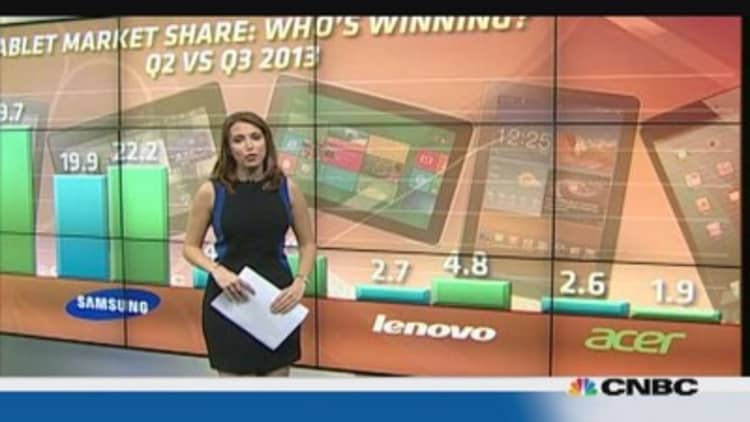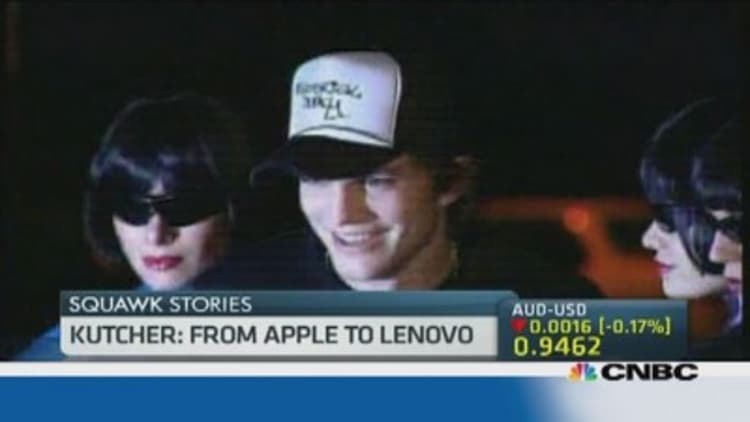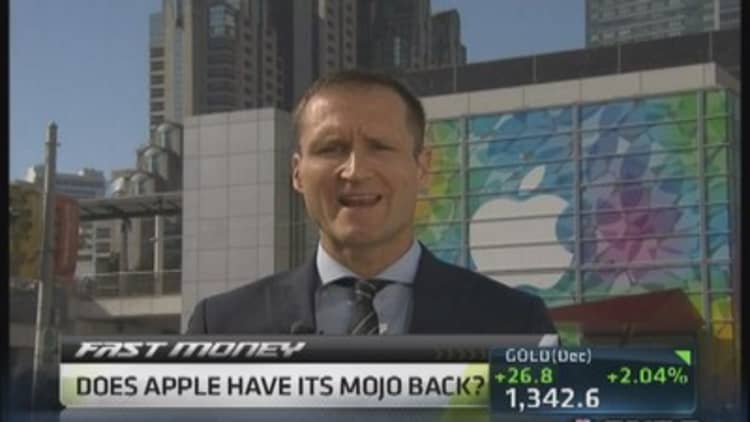
Since Steve Jobs stepped out onto the stage to launch the world's first iPad in the second quarter of 2010, Apple's offering has been the device to beat in the tablet space.
Apple has sold over 170 million tablets since the iPad's debut and if analyst expectations are to be believed, that number will balloon in the current quarter thanks to the release of the iPad Air and iPad Mini with Retina.
But while many analysts are bullish on Apple's latest offerings, the cold hard facts reveal the iPad king is losing market share in the tablet space.
(Read more: Apple's tablet competitors)
New data compiled by research firm IHS show Apple's market share slipped to 29.7 percent in the third quarter from 33.5 percent in the previous quarter.
Meanwhile, aggressive pricing strategies are seeing companies such as Samsung, Lenovo and Taiwan's Asus gain ground in the tablet space.
As demand for smartphones tapers off, Samsung has begun to focus on the tablet market. The South Korean tech giant is now one place behind Apple with 22.2 percent of the market.
(Read more: Is Samsung losing its earnings momentum?)
Addressing analysts on its third quarter earnings call, Samsung said it plans to increase tablet shipments by 20 percent in the fourth quarter to take advantage of demand over the all-important Christmas period.
Rhonda Alexander, director of tablet research at IHS, says Samsung is employing a similar strategy to the one it used to beat Apple in smartphone shipments – offering users a range of options at a variety of price points.
(Read more: Don't want an iPad? Here are some tablet alternatives)

"The erosion in Apple's unit shipment market share was inevitable… Cheaper almost always wins the volume race, and the competitors were quick to adjust pricing when it became clear that it was impossible to achieve anything close to Apple's unit growth at the same price level," she said.
This has seen a surge in the number of tablets selling for less than $250 dollars – helping lift Android to the number one operating system by tablet shipments in the quarter.
(Read more: Nokia enters thegreat tablet race)
But the race to the bottom on prices is putting serious pressure on product quality.
The IHS survey remarks on the rise of so called 'white box' vendors – little-known regional tablet makers in China that form a large portion of the 'others category' – which accounts for 34.2 percent of the market. They sell 7-inch android-based devices for $100 or less.
"The cheaper tablets tend to have much higher return and failure rates. This results in much shorter overall product lifetimes in the Android market than in the iOS space, and contributes to iOS still leading the tablet market in installed base, despite Android's lead in unit shipments over the past year."

At Apple's fourth-quarter results, it claimed to hold an 81 percent share of tablets currently in use. This is a key metric used by content and app developers for deciding which operating systems to align with. Many developers have voiced their frustration with the Android operating system due to the lack of uniformity across devices.
For these reasons, Alexander says the tablet market remains bifurcated, noting "Apple is yet to experience any serious competition for the premier customer" and should therefore be "on track to lead the tablet market on revenue for years to come."
(Read more: And the verdict on the iPad Air is...)
Other analysts expect strong demand for Apple's new products.
"We expect extremely robust demand for Apple's new product portfolio and expect upside to be contingent on Apple's ability to continue ramping supply of the new iPhone and iPad products. Beyond the December [quarter], we expect solid momentum behind [Apple] to continue into 2014 as the iPhone and iPad hit larger geographic rollouts," Deutsche Bank analyst Chris Whitmore said in a note. He expects Apple to sell 24.5 million iPads in the December quarter.
Rob Cihra of Evercore predicts Apple will sell 25 million units in the period.
"We think the new iPad Air revamp in particular ignites a bigger refresh cycle than widely expected, even while Retina looks supply constrained into the March quarter," he said.
— By CNBC's Julia Wood. Follow her on Twitter: @JuliaCNBC

